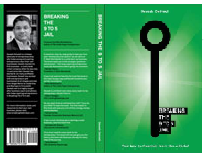Grow Your Side Hustle, Escape the 9 to 5!
Posted Under: Tips & Tricks!
Back in May this year, I had the opportunity to chat with the Genjuice community. We had a live Facebook Q&A where many aspiring entrepreneurs asked me questions about growing their side project to escape the rat race. Below is the summary that they published later and I’m re-publishing & sharing it with you to help those of you who may have similar curiosities. So, here’s the Q&A chat to help you grow your side hustle and escape the 9 to 5:
Last week GenJuicers rocked Facebook with questions for entrepreneur Devesh Dwivedi, an expert on breaking free from 9 to 5 daily grind.
Devesh started his first business, a comic books rental company, when he was only 14, and since then he has founded and co-founded several businesses. He has an MBA and worked for multiple Fortune 100s in corporate America, but, being a square peg, he never fit in that round hole. Today he loves helping aspiring entrepreneurs.
Many thanks to Devesh for his insight and to our inquisitive GenJuicers.
Question 1
Hi Devesh! What is a brief checklist of what should be accomplished for your business before walking away from your 9 to 5?
Well, the first one is finding a profitable idea by rigorously testing out the many “wonderful” ideas you’re flirting with!
Second would be finding your survival model – A. Will you flip burgers and work on your startup? B. Will you stay in some part-time job while you build your startup and C. Will you help another startup to make some money while you work on yours as well (learning benefit)?
Point is “burn the ship and bridges” is a romantic notion of walking away from 9 to 5; however, you’ve got to be careful about a lot of unromantic stuff in building a business before you get to that romance.
Question 2
What are some (ethical) ways for someone to leverage the resources at their current full-time job for a business they’re building on the side?
1. Read the employee handbook. I know I know; no one does, and you don’t look cool while reading, but that’s your Bible to understanding what is and isn’t acceptable at your employer, so make sure you find out your limits and respect them.
2. Make sure you don’t steal – the hours or goodies!!
3. Build strong relationships and most importantly build as strong relationship with your immediate boss as possible. Then leverage that to get some special permissions like telecommute, or flexible hours etc to better manage your time and productivity at both your job and the side gig.
4. Learn the industry, and use this time to dig deeper into and test all your ideas. You gotta come up with an idea that’s profitable and sustainable and doesn’t just sound like it. Understand what you’re going to do and why will someone pay for it.
Question 3
What are some websites/books/other resources that could help in transitioning from a standard 9-to-5 to working full-time on my venture?
I suggest the following: Michael E Gerber’s E-Myth; Young Entrepreneur Council; Scott Gerber’s Never get a real job; Pamela Slim’s Escape from Cubicle Nation; Mike Michalowicz’s Toilet Paper Entrepreneur
Question 4
I hear you should be making 3x your salary at your side biz before taking it on full time. Is this a good rule of thumb?
You should be grateful if you make 1/3rd of your salary at your startup/side biz before you walk away from your 9 to 5. Of course there are the success stories that we all would love to repeat, but most side businesses would remain side businesses with little or no income unless given due time and investments. I’ve never heard of this rule, but I suggest don’t wait for that day because it’s not coming.
I’ve heard the “rule” that you should charge 3X your current hourly rate at the employer, in case you decide to go the consulting or freelancing route, and that makes sense because it takes into account parts of the compensation that we don’t usually count when we look at compensation as factor or our time’s worth, compensation like the vacation, sick days, benefits, bonuses, etc., altogether make up the compensation and not just your salary. It could be good rule; however, pricing shouldn’t be done on such cookie cutter rules.
Question 5
What people/resources/knowledge were most useful to you personally in realizing you could break the 9 to 5 jail?
Well, I was an entrepreneur before going for an MBA and then being sentenced to Fortune 50 jails so for me it was quite a black and white comparison – my experiences at any of the traditional jobs I ever held never came even close to the freedom, the power, the risks and rewards that I had already experienced as an entrepreneur.
Resources and knowledge – 1. I started a Consulting Business on the side where I worked with hundreds of startups and learned a great deal at each one of my assignment. 2. Reading a lot and then writing my own.
Question 6
Can you share an example of someone who was not successful in quitting their corporate job and building a business out of their passion? What can we learn from them?
Of course! Not all stories have a happy ending, and while I would not call any name for being unsuccessful, I would absolutely love to share my observation. Yes it is very important to love and be passionate about what you do. But what’s even more critical are survival and success. Nothing will make you money simply because you’re passionate about it. You need to build a profitable and sustainable business around that passion, so think of a revenue model. Build a service or product (around your passion) that people need or would pay for. So, marrying your passion with a solid business and revenue model is the key to success. Passion alone will end up being either a nonprofit or failure.
Question 7
As an undergrad about to finish a degree with a specialization in Entrepreneurship, but not currently having “the” idea, what types of jobs or companies are BEST to try and seek employment with in order to build the skill set necessary to be starting my own venture a few years down the road?
Working at any startup or recently successful startup would be great start simply because you get to see the struggle, the hustle, and the challenges first hand. Plus, since you’ll be away from corporate bureaucracy, you’ll learn more.
Question 8
What are some ways to develop and build key business skills and experience in finance and entrepreneurship?
1. Working at a startup or a small business always helps simply because the closer you’re to calling the shots or whoever is calling the shots, you understand this game better.
2. Consume, but spit it out too. When you read a book or blog, make sure you comment on or review the content you just consumed, this helps you better understand what you just read and gives YOU a voice as well.
3. Consulting small businesses can be another successful way to be closer to them, getting to see them inside out and develop skills.
Question 9
I’ve been researching and educating myself on business and finance for the last two years. I really want to take it to the next level now, but I want it to be official and thoroughly planned. I want to star a T-shirt company but I really need insight on the best steps to take in general.
Two years, wow. Sound like you’re waiting for the perfect time! I’d highly recommend not waiting any longer and starting to take some action steps towards turning your idea into a business.
1. At this point I would suggest you document a Business Action Plan. Simply pick every element of your business (Idea, Target Market, Product, Operations, Strategy, Marketing, Finances etc) and add details to each element in precisely six dimensions – What, Why, Who, How, When, and Action Steps. Remember, our mind is incapable of having a plan inside; we can conceive ideas in our mind but not a plan because an effective plan is when you pen down the idea and add all the elements of execution to it.
2. I would also identify your USP (Unique Selling Point)… in the age of threadless, cafepress where I can get a custom T to GAP & Armani Exchange and many in between, how is your T better or cheaper or exclusive or simply put, why should I buy it?
Question 10
Can you give us tips for assessing the sustainability of a “side hustle” or “idea” before attempting to leverage it as a full-time business?
I suggest work on making money with your idea first, doesn’t matter how much, just find real customers to pay for your service or product, this takes care of the profitability and feasibility of the idea. Then look at your product and service from a scalability point of view, could this be multiplied and grown bigger with and without you. Last but not the least, understand the long term potential of opportunity. Is your product or service based on a current trend or fashion that will fade away sooner or later? Or is it based on a nuts and bolts opportunity in the market? I’m sure you’d know the answer.
Question 11
Do you feel time efficiency is key in big any successful business? Do you feel that maximum effort exerted into business will reap best results?
Work smart or hard isn’t the question in a startup setting. You gotta smartly work very hard in order to build a business. This means leverage the tools and technologies available to not waste or duplicate your efforts. I believe rewards are directly proportional to risks and efforts so if you put in side gig efforts and take side gig level risks, it will always remain a side gig. You know what to do!
Comment from a fellow Genjuicer: I think you need to know your audience and what they find value in too.
Question 12
Can you name three businesses you’re a fan of and why?
Apple Apple Apple! Steve Jobs is a great example of being a true entrepreneur who knows how to spot an opportunity and build a winning product or service around it.
Question 13
What is the best way to build “advisors” to share in one’s business idea?
1. Ask!
2. Work with biz bloggers and advisors; you’ll be surprised that we are very easy to work with.
3. SCORE or SBDC is your city could be a great FREE resource.
4. Successful business owners in your neighborhood or online (LinkedIn FB etc all have the groups and forums of almost all industry and expertise)
5. Forget the NDA unless it’s a “rocket science” formula you’ve figured out.
Originally put together and published by GenJuice in May 2011.
Share your questions about starting a small business on the side to escape from 9to5 in the comments below and I will do my best to help.



 Aug 27, 2011–!>
Aug 27, 2011–!>


